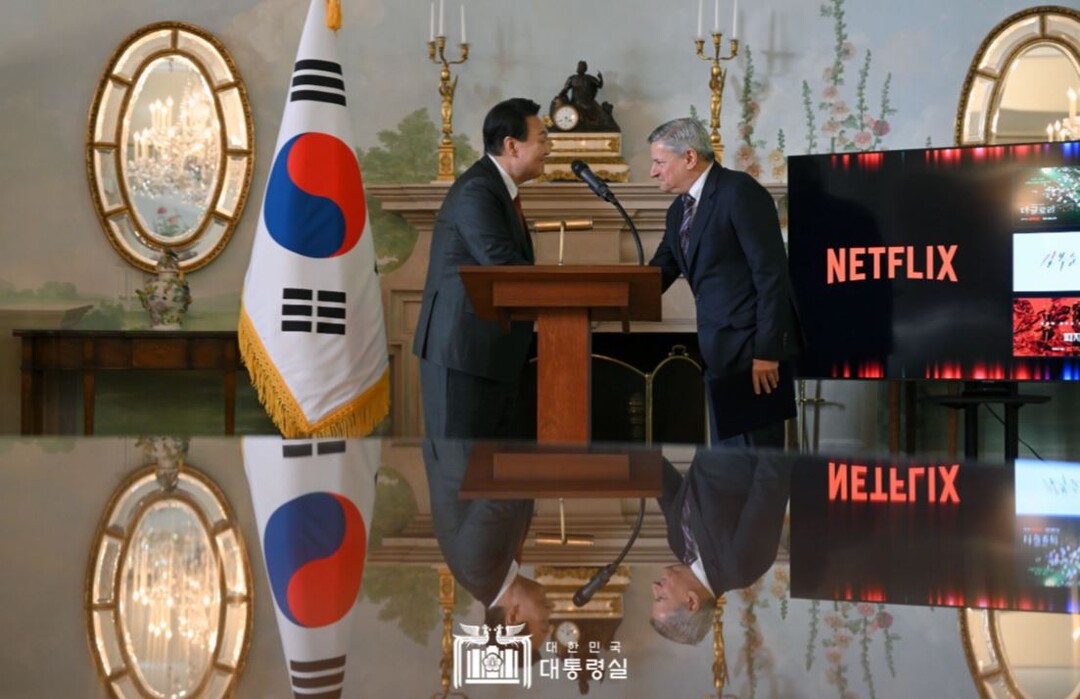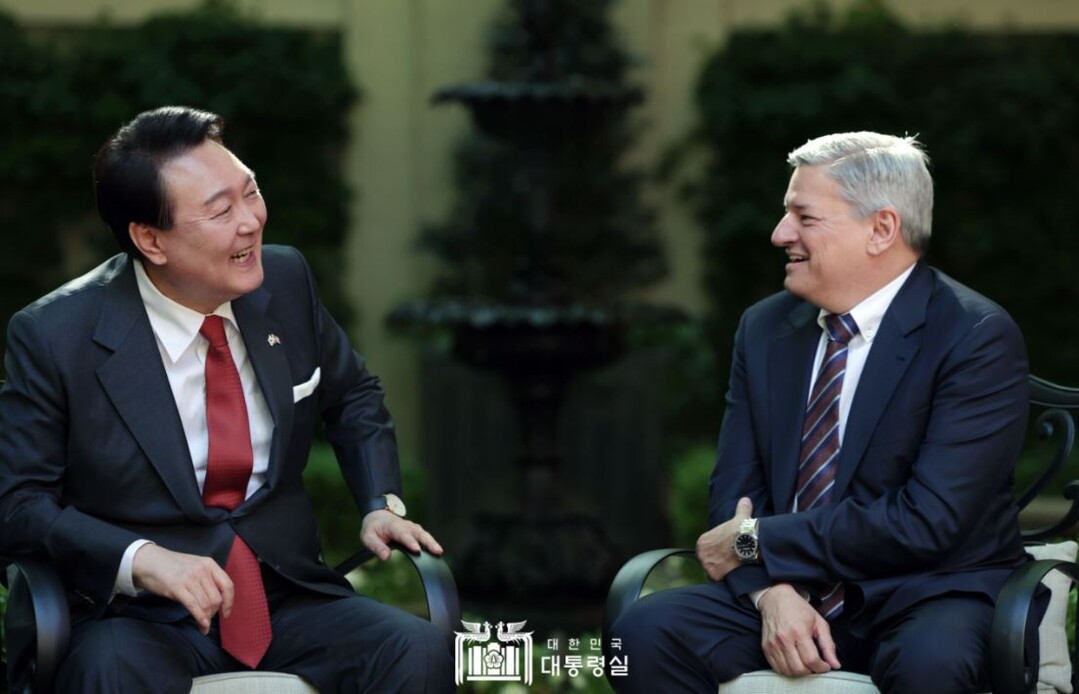Captured from the website of the Office of the President of the Republic of Korea
In a major move for the South Korean creative content industry, Netflix's chief, Ted Sarandos, announced a $2.5 billion investment in Korean content for the next four years during South Korean President Yoon Suk Yeol’s recent US state visit. The news made headlines in local media outlets and was welcomed by President Yoon as an "unprecedented investment." However, some industry experts are questioning whether the investment will truly benefit local creators as Netflix maintains control over intellectual property.
Netflix had previously announced a $370 million investment in Korean dramas, films, and unscripted shows for 2021, but did not release an official figure for 2022. Industry insiders speculate that the company spent closer to 700 or 800 billion won as it created 10 more original series compared to the year before. If Netflix invests on a similar scale over the next four years, it would amount to almost 3.2 trillion won, close to the $2.5 billion pledged by Sarandos.
 |
| ▲ Captured from the website of the Office of the President of the Republic of Korea |
Yu Hyun-jae, a communications professor at Sogang University, sees South Korea as Netflix's "cash cow" at the moment and believes that the recent investment announcement was not surprising in terms of numbers. He notes that 60% of Netflix's global viewers already enjoy its Korean originals, and the announcement could incite blind nationalism and lead local viewers to continue showing their loyalty to Netflix's content. However, Yu and other experts believe that there are pressing policy issues that need to be addressed, such as tax, internet access fees, and guidelines for self-rating, in order to truly promote and develop local streaming services.
Another issue raised by Yu is the revenue structure for Netflix's original projects. While creators receive 110% of the estimated production costs to produce the series, the revenue belongs to Netflix, and the company monopolizes all intellectual property, including domestic and international broadcasting rights, reproduction rights, and control over derivative works. This arrangement could disadvantage local creators who rely on intellectual property ownership to grow their business.
Lee Sang-baek, CEO of Astory, the production company behind "Kingdom," a popular Netflix original, agrees that IP ownership is one of the most important survival strategies for small and medium-sized production companies. While Astory was not able to monetize "Kingdom," the company offered various other ways to enjoy "Extraordinary Attorney Woo" content, including a webtoon, a musical, and a possible US adaptation after joining hands with local cable channel ENA.
Despite the concerns raised by industry experts, some insiders are optimistic about the pledged investment. Naver Webtoon CEO Kim Jun-koo sees the investment as a benefit to Naver Webtoon creators and an opportunity for companies from different business sectors to find content they like on their platform. Studio LuluLala, formerly known as JTBC Studios, finds the investment encouraging and hopes it will provide momentum for content businesses to expand overseas and execute different global strategies.
The creative content industry has long struggled financially, and some are hoping that Netflix's latest announcement will provide some relief. However, there is still much to be done to address policy issues and ensure that local creators truly benefit from the investment. As the global content industry becomes increasingly competitive, the success of Korean content will depend not only on investments but also on effective policies and a commitment to supporting local creators.
Sayart.net
BlueYIM, yimyoungseo1010@naver.com
Some Experts Wonder if the Investment Will Truly Benefit Local Creators as Netflix Maintains Control Over Intellectual Property
Captured from the website of the Office of the President of the Republic of Korea
In a major move for the South Korean creative content industry, Netflix's chief, Ted Sarandos, announced a $2.5 billion investment in Korean content for the next four years during South Korean President Yoon Suk Yeol’s recent US state visit. The news made headlines in local media outlets and was welcomed by President Yoon as an "unprecedented investment." However, some industry experts are questioning whether the investment will truly benefit local creators as Netflix maintains control over intellectual property.
Netflix had previously announced a $370 million investment in Korean dramas, films, and unscripted shows for 2021, but did not release an official figure for 2022. Industry insiders speculate that the company spent closer to 700 or 800 billion won as it created 10 more original series compared to the year before. If Netflix invests on a similar scale over the next four years, it would amount to almost 3.2 trillion won, close to the $2.5 billion pledged by Sarandos.
 |
| ▲ Captured from the website of the Office of the President of the Republic of Korea |
Yu Hyun-jae, a communications professor at Sogang University, sees South Korea as Netflix's "cash cow" at the moment and believes that the recent investment announcement was not surprising in terms of numbers. He notes that 60% of Netflix's global viewers already enjoy its Korean originals, and the announcement could incite blind nationalism and lead local viewers to continue showing their loyalty to Netflix's content. However, Yu and other experts believe that there are pressing policy issues that need to be addressed, such as tax, internet access fees, and guidelines for self-rating, in order to truly promote and develop local streaming services.
Another issue raised by Yu is the revenue structure for Netflix's original projects. While creators receive 110% of the estimated production costs to produce the series, the revenue belongs to Netflix, and the company monopolizes all intellectual property, including domestic and international broadcasting rights, reproduction rights, and control over derivative works. This arrangement could disadvantage local creators who rely on intellectual property ownership to grow their business.
Lee Sang-baek, CEO of Astory, the production company behind "Kingdom," a popular Netflix original, agrees that IP ownership is one of the most important survival strategies for small and medium-sized production companies. While Astory was not able to monetize "Kingdom," the company offered various other ways to enjoy "Extraordinary Attorney Woo" content, including a webtoon, a musical, and a possible US adaptation after joining hands with local cable channel ENA.
Despite the concerns raised by industry experts, some insiders are optimistic about the pledged investment. Naver Webtoon CEO Kim Jun-koo sees the investment as a benefit to Naver Webtoon creators and an opportunity for companies from different business sectors to find content they like on their platform. Studio LuluLala, formerly known as JTBC Studios, finds the investment encouraging and hopes it will provide momentum for content businesses to expand overseas and execute different global strategies.
The creative content industry has long struggled financially, and some are hoping that Netflix's latest announcement will provide some relief. However, there is still much to be done to address policy issues and ensure that local creators truly benefit from the investment. As the global content industry becomes increasingly competitive, the success of Korean content will depend not only on investments but also on effective policies and a commitment to supporting local creators.
Sayart.net
BlueYIM, yimyoungseo1010@naver.com
Related articles
- NCT Dream to Reunite with Fans in Seoul Encore Concert After Successful US Tour
- K-Pop Girl Group Le Sserafim to Release First Full-Length Album in May
- K-pop Industry Giants Hybe and KOZ Entertainment Launching New Boy Bands in May
- Melon Creates Eco-Friendly BTS Forest in Seoul Park with Fan Donations

















